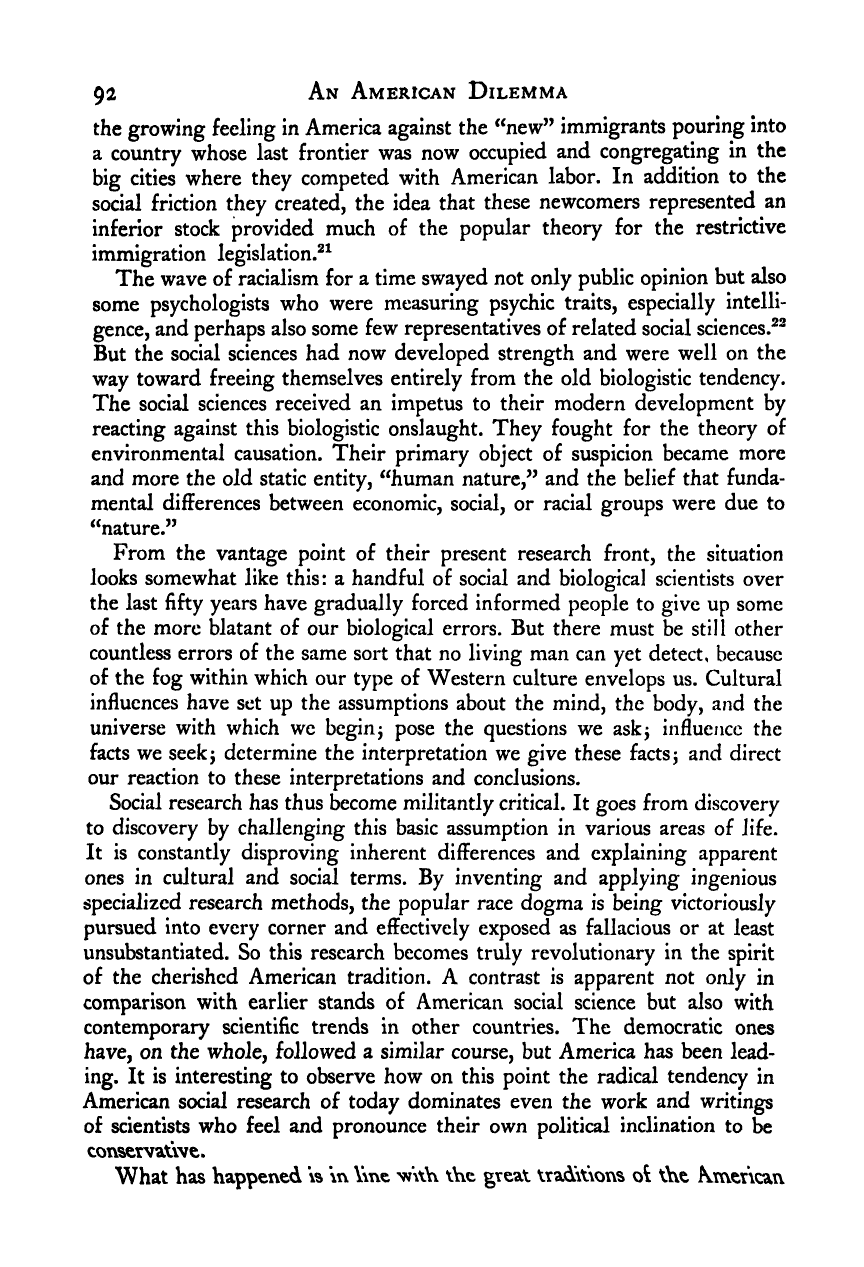Note: Gunnar Myrdal died in 1987, less than 70 years ago. Therefore, this work is protected by copyright, restricting your legal rights to reproduce it. However, you are welcome to view it on screen, as you do now. Read more about copyright.
Full resolution (TIFF) - On this page / på denna sida - II. Race - 4. Racial Beliefs - 4. Reflections in Science

<< prev. page << föreg. sida << >> nästa sida >> next page >>
Below is the raw OCR text
from the above scanned image.
Do you see an error? Proofread the page now!
Här nedan syns maskintolkade texten från faksimilbilden ovan.
Ser du något fel? Korrekturläs sidan nu!
This page has never been proofread. / Denna sida har aldrig korrekturlästs.
92 An American Dilemma
the growing feeling in America against the ^^new” immigrants pouring into
a country whose last frontier was now occupied and congregating in the
big cities where they competed with American labor. In addition to the
social friction they created, the idea that these newcomers represented an
inferior stock provided much of the popular theory for the restrictive
immigration legislation.^^
The wave of racialism for a time swayed not only public opinion but also
some psychologists who were measuring psychic traits, especially intelli-
gence, and perhaps also some few representatives of related social sciences.^^
But the social sciences had now developed strength and were well on the
way toward freeing themselves entirely from the old biologistic tendency.
The social sciences received an impetus to their modern development by
reacting against this biologistic onslaught. They fought for the theory of
environmental causation. Their primary object of suspicion became more
and more the old static entity, ^^human nature,” and the belief that funda-
mental differences between economic, social, or racial groups were due to
^‘nature.”
From the vantage point of their present research front, the situation
looks somewhat like this: a handful of social and biological scientists over
the last fifty years have gradually forced informed people to give up some
of the more blatant of our biological errors. But there must be still other
countless errors of the same sort that no living man can yet detect, because
of the fog within which our type of Western culture envelops us. Cultural
influences have set up the assumptions about the mind, the body, and the
universe with which we begin j
pose the questions we askj influence the
facts we seekj determine the interpretation we give these facts 3
and direct
our reaction to these interpretations and conclusions.
Social research has thus become militantly critical. It goes from discovery
to discovery by challenging this basic assumption in various areas of life.
It is constantly disproving inherent differences and explaining apparent
ones in cultural and social terms. By inventing and applying ingenious
specialized research methods, the popular race dogma is being victoriously
pursued into every corner and effectively exposed as fallacious or at least
unsubstantiated. So this research becomes truly revolutionary in the spirit
of the cherished American tradition. A contrast is apparent not only in
comparison with earlier stands of American social science but also with
contemporary scientific trends in other countries. The democratic ones
have, on the whole, followed a similar course, but America has been lead-
ing. It is interesting to observe how on this point the radical tendency in
American social research of today dominates even the work and writings
of scientists who feel and pronounce their own political inclination to be
conservatwe.
What has happened \s \n Vine xVie great. ttadvtAons ot lYve Xmer\can
<< prev. page << föreg. sida << >> nästa sida >> next page >>